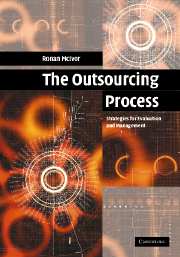Book contents
- Frontmatter
- Contents
- List of figures
- List of tables
- List of illustrations
- Acknowledgements
- 1 Introduction
- 2 The trend towards outsourcing
- 3 Theoretical influences on outsourcing
- 4 The outsourcing process: a framework for evaluation and management
- 5 Determining the current boundary of the organisation
- 6 Activity importance analysis
- 7 Capability analysis
- 8 An analysis of the strategic sourcing options
- 9 Developing the relationship strategy
- 10 Establish, manage and evaluate the relationship
- 11 Case study – outsourcing experiences at Telco
- 12 Conclusions
- Index
- References
3 - Theoretical influences on outsourcing
Published online by Cambridge University Press: 21 August 2009
- Frontmatter
- Contents
- List of figures
- List of tables
- List of illustrations
- Acknowledgements
- 1 Introduction
- 2 The trend towards outsourcing
- 3 Theoretical influences on outsourcing
- 4 The outsourcing process: a framework for evaluation and management
- 5 Determining the current boundary of the organisation
- 6 Activity importance analysis
- 7 Capability analysis
- 8 An analysis of the strategic sourcing options
- 9 Developing the relationship strategy
- 10 Establish, manage and evaluate the relationship
- 11 Case study – outsourcing experiences at Telco
- 12 Conclusions
- Index
- References
Summary
Introduction
This chapter provides an overview of the theoretical perspectives that have influenced the development of the framework for outsourcing evaluation and management. The framework draws upon a wide body of literature from a number of areas including business strategy, economics and inter-organisational relationships. This chapter outlines the characteristics and limitations of a number of theories from these areas including transaction cost economics (TCE), the resource-based view of the firm (RBV), the industry view (IV) and the relational view (RV). The analysis of the literature in these areas has had a major influence on the development of the outsourcing framework, which includes a number of aspects from each theoretical standpoint. It is argued that there are a number of inter-dependencies with each of the theoretical perspectives that can assist in outsourcing evaluation and management. The framework recognises the importance of the business strategy and inter-organisational relationship literature to an understanding of outsourcing. There is a growing emphasis in the business strategy literature of the importance of managing beyond the boundaries of the firm as well as within them. This chapter serves as a preface to the following chapter, which provides an outline of the practical problems with outsourcing and an overview of the stages in outsourcing evaluation and management.
Transaction cost economics
The most influential theory on outsourcing has been Williamson's theory of transaction cost economics (1975).
Information
- Type
- Chapter
- Information
- The Outsourcing ProcessStrategies for Evaluation and Management, pp. 40 - 62Publisher: Cambridge University PressPrint publication year: 2005
